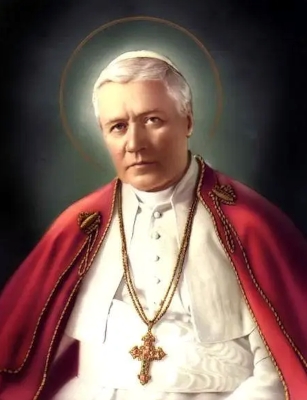Lives of the Saints
Our Models and Protectors
Spiritual Bouquet:
September 3

Saint Pius X
Pope
(1836-1914)
This canonized holy Pope of the twentieth century remains beloved by all as the Pope of Frequent Communion. This is indeed a beautiful and fitting title, but we would like to stress here what is less known of his pontifical works — his battle to conserve the faith against those mining it from within.
Joseph Sarto, born in 1836 into a family poor in earthly goods but very rich in virtue, was the first living son of eight children, including six sisters. He soon found himself orphaned of his profoundly Christian father; Joseph had already announced his desire to become a priest, and his parents had approved. When his widowed mother continued to desire like himself this unique ambition of her son, their parish priest found financial aid for him.
He became an assistant priest in 1858, and in 1867 was named in charge of the large parish church of Salzano. His three unmarried sisters followed him, as they would do even to the Vatican. He was immediately appreciated by his parishioners, then seen as heroic when an epidemic of cholera broke out. An ecclesiastic who witnessed his activity wrote that he was everywhere present. He buried the dead and confessed the sick; he saw to the needs of the various houses, he gave remedies if necessary, at all hours of the day and night. He did not permit his vicars to expose themselves to a danger associated with a duty which was first of all that of the parish priest. He inspired courage in all. His sisters tried in vain to moderate his zeal, but the Padre did not contract the disease, and continued to need only four hours of sleep all the time of his pastoral life. In 1875 he was named a Canon of the cathedral of Trevise, where he fulfilled the administrative and pastoral duties of that charge with a success that edified all concerned.
In Trevise Father Sarto learned of his nomination in 1884 as bishop of Mantua. He asked not to be received at Mantua by a brilliant reception, but that his diocesans come to the cathedral to pray with him and receive Communion. As bishop he taught catechism to the children and continued to visit the sick like a parish priest; and it seemed to them that it was his passage among them which cured them. He manifested a remarkable compassion for the working people. He defended a man who had calumniated him and who soon afterwards was ruined financially, and sent money anonymously to his wife.
In 1891 he became Patriarch of Venice, and never was there one more appreciated than Monsignor Sarto after his arrival. Twelve years there confirmed the inhabitants' profound affection and respect for him, until in 1903 his final promotion came about at the death of Leo XIII. He was chosen to replace him in the Vatican in that year, as Vicar of Christ.
He saw with perfect perspicacity that the Church was falling ever more deeply into the disastrous errors of modernism, that crossroads of every heresy. The teachings of his predecessors had entered into deaf ears; everywhere defenders of the Catholic heritage in all domains were becoming sparse. Nonetheless there remained a group of them to second their Head, and strive with him to arrest the rising tide. Saint Pius X absolutely supported all that the great encyclicals of Popes Leo XIII and Pius IX had proclaimed or enjoined upon the authorities of the Church. He brought about the resignation of a considerable number who resisted that authority and who in ambiguous language continued to promulgate the subtle errors propagated by the manifold isms, the false doctrines of the modern world separated from Christ.
He will always be known as the Pope of the Eucharist. For he was determined that the faithful should imitate the example of the earliest Christians. In consequence, he urged the reception of frequent and even daily Holy Communion for all in the state of sanctifying grace and of right intention. He insisted that children be allowed to the Spiritual Banquet prepared by Jesus at an earliest age, and declared that they were bound to fulfill the precept of the Easter Communion as soon as they reach the age of discretion.
Saint Pius labored until the very last days of his life. His Will and Testament contained the words: I was born poor, I have lived poor, and I wish to die poor. He died in 1914 at the age of 78 years, at the onset of the First World War, which he had foreseen. He was canonized by Pope Pius XII forty years later, on May 29, 1954, and recognized universally as a Saint for his charity, his piety, his zeal.
Reflection: Our duty, says Father Newman, is to follow the Vicar of Christ wherever he goes and never to desert him, whatever the cost, but to defend him from all hazards and against all comers, as a son would a father, knowing that his cause is always the cause of God.
Pie X, by René Bazin (Flammarion: Paris, 1928); Les jours et les travaux du bienheureux Pie X, photo album with commentaries (Rome, 1951); Heavenly Friends, by Rosalie Marie Levy (St. Paul Editions: Boston, 1984).